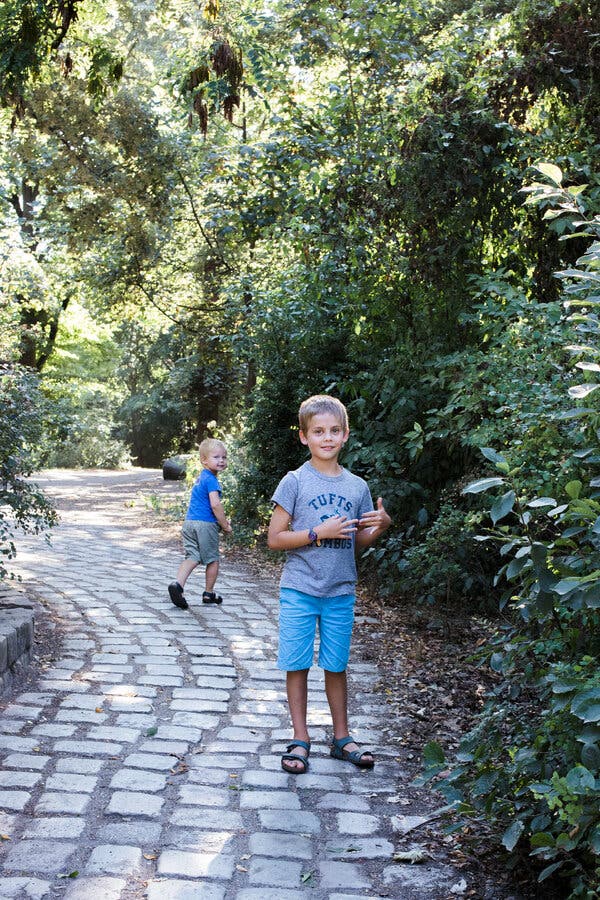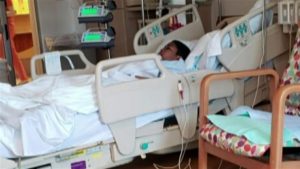BERLIN — The news that children in Berlin would return to classrooms last spring caught me and my husband by surprise. Like parents across the world, we were very concerned about anyone in our family getting or spreading the coronavirus.
We knew people who had secretly organized play dates and flouted the rules during the months we were supposed to be isolating, but we had followed the rules scrupulously. We wore masks, kept our distance from our parents, and even, when playgrounds reopened on April 30, resisted returning to them, despite our younger son’s pleas.
At first, we were surprised by the authorities’ insistence that children return to school. I tried to read as much as I could to help me stay calm. When I learned about a leading group of German pediatricians who supported the idea of children, especially young ones, returning to school, largely for their mental well-being, I was persuaded. I could tell that my sons, Hugo, 8, and Bruno, 3, were suffering in many small ways from the lack of contact with other kids and from the insularity of our new way of life.
The Berlin Senate stipulated that schools could only allow children to return with very strict hygiene and social distancing measures in place. Each school, however, was responsible for implementing its own safety rules as long as they aligned with the Senate’s guidelines. At that time, there had been about 5,400 Covid-19 infections in Berlin and 112 deaths.
In our son’s school, the administration divided each elementary class in half, then assigned each group a single teacher. The administration enlisted faculty from other parts of the school, like librarians and vice principals, to replace teachers who were considered high-risk and were not required to return to the classroom.
The groups of students entered school at staggered times, sat alone instead of in pairs, and were taught only two core subjects, math and language arts. The children were not allowed to have recess, break for a snack or eat lunch in the cafeteria. Masks were not mandated.
Because of the complexity of the scheduling, the safety requirements, the many missing teachers and the limited availability of classrooms, my oldest son was only in school physically for a week in May and a week in June, for three hours each day. The remaining time, he was at home remote learning.
The new rules at day cares, which are called KiTas for Kindertagesstätten in German, were less stringent than at school. Child psychologists recommended that KiTa caregivers not wear masks. Parents were no longer allowed inside and children were dropped off and picked-up at the front door.
Hugo, who was in second grade, was very anxious about returning to school, fearing that he would get us or his grandparents sick. We swallowed our misgivings and told him that we trusted the school’s decisions and that neither the school nor we would knowingly put him in harm’s way.
After only a couple days in the classroom, we could see how being back at school physically helped Hugo enormously. Spending time with his teacher and being around his classmates was clearly important to his mental well-being. The semblance of normalcy mitigated his fears of the virus and improved his at-home learning, too.
Seeing him blossom after months of isolation helped me relax. We soon started organizing play dates for him again. Bruno, too young to be scared by an invisible virus, was just thrilled to return to KiTa.
The return to some aspects of our old lives felt so good and also essential for our mental health as parents. It was lovely to see our children in their old environments, connecting with other children, and being loved and cared for by other people again.
The Coronavirus Outbreak
Back to School
Updated Aug. 7, 2020
The latest highlights as the first students return to U.S. schools.
-
- Schools are open in parts of the country — and some are already closing again. Students have already faced altered classrooms and emergency quarantines. We spoke to some to see what school is like in the age of Covid-19.
- Photos of a crowded high school hallway evoked outrage on social media. The student who took them says she was suspended.
- Faced with remote learning or socially distanced classroom options, some parents of rising kindergartners are considering holding their kids back.
- Teachers, show us your classrooms! We want to see how educators are preparing to keep themselves and students safe if their schools open this fall.
But by the end of the second week of KiTa, Bruno came home with a fever and a runny nose, symptoms that quickly spread to our older son and then my husband. I spent 48 hours very worried that we’d all been exposed to the coronavirus and went around our apartment rubbing disinfectant wipes on door knobs and surfaces. Those fears turned out to be unfounded, but they lurk in the back of my mind constantly.
Most schools in Berlin resume on Monday. After a quiet summer, infections have started rising again in Germany and the health authorities have made appeals to the public to stay vigilant. As of Wednesday, there were 9,399 coronavirus cases and 223 total deaths in Berlin.
On Tuesday, the Senate published their latest guidelines that require schools to return to regular operations, including instruction in all subjects, as well as extracurricular activities, without the requirement of social distancing. For now, the hygiene rules stipulate masks, regular ventilation and hand-washing, as well as the avoidance of body contact. Schools are being asked to come up with creative outdoor solutions for certain, subjects like music and drama. All employees of schools and KiTas can be tested for the virus for free, even without symptoms.
My husband and I, like many other parents, are concerned that it will just be a matter of time before our schools are forced to close, either partially or completely. The responsibility for closing a school lies with the local health authority of the city district, not with the school administration.
We feel lucky to live in a country where the virus has been taken seriously by most and where the social safety net is strong. Our medical system is well-prepared. However, we’re surprised that the educational authorities didn’t seem to use the summer to prepare for the inevitable return of the virus and that families are being thrown into an unnecessary state of uncertainty so shortly before the start of school. We know we are still far away from a normal life, especially with regard to our children’s education.
Luisa Weiss is a writer and freelance translator and editor living in Berlin. She is the author of “Classic German Baking” and “My Berlin Kitchen.”



















